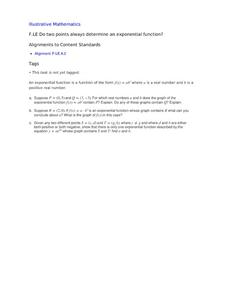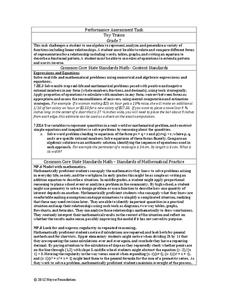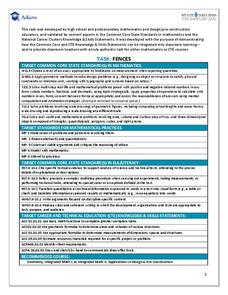Benjamin Franklin High School
Saxon Math: Algebra 2 (Section 1)
This first of twelve algebra 2 resources provides a broad review of many algebra 1 concepts through a number of separable lessons and labs. Starting with the real number system and its subsystems, the sections quickly but thoroughly move...
Mathematics Vision Project
Module 3: Polynomial Functions
An informative module highlights eight polynomial concepts. Learners work with polynomial functions, expressions, and equations through graphing, simplifying, and solving.
Childnet International
Crossing the Line: Sexting
Technology may be changing every day, but peer pressure remains difficult for teenagers to resist. After watching a video about feeling pressured to text provocative pictures, middle schoolers learn about the laws and school policy...
Curated OER
Rap Your Way Through Integers
Your resource or special education class will have fun with this interesting approach to learning about integers. They use rap, movement, and an interactive online game to reinforce the rules of integers. A well-rounded lesson that...
Alabama Learning Exchange
Human Slope
Middle and high schoolers explore the concept of slope. In this slope lesson, learners graph lines using a life-size graph. They use chalk on a blacktop to create a coordinate plane and use each other as the tick marks on the grid....
Primary Resources
Coordinate Geometry
Introduce your fifth graders to the coordinate plane, ordered pairs, and plotting points on any of the four quadrants. This wonderful resource makes preparation for your math class quick and easy. It explains everything the class will...
Willow Tree
Order of Operations
It's the classic please excuse my dear aunt sally strategy to remembering the order of operations. Young mathematicians practice to develop an understanding of the order of operations. Examples and practice problems include absolute...
Lafayette Parrish School System
Teaching Tone and Mood
Tone and Mood are not synonymous! Introduce young readers to these literary devices with a series of exercises that not only point out the significant differences between the terms but also shows them how to identify both the tone and...
West Contra Costa Unified School District
Graph Square Root and Cube Root Functions
Scholars first learn to graph square root and cube root functions by creating a table of values. They then learn how to graph functions from transformation of the graphs of the parent square root and cube root functions.
Curated OER
Spelling: Accept / Except
Ten sentences provide practice in using accept or except correctly. Good for use after you review the meanings of these two commonly confused words. Online, the key is visible from the same page as the exercise. When you print it,...
Curated OER
Estimating Heat Changes during Reactions Using Bond Energies
For advanced chemists, this worksheet examines heat change during chemcial reactions. Alkanes are examined first. Learners calculate the energy released or needed during a reaction.
Curated OER
Interesting Integers and Exciting Equations
An 80-page resource provides four lessons and all associated worksheets to teach middle schoolers about expressions and equations. The lessons are hands-on, using games, "integer chips," a balance and cubes, and cut and paste activities....
Facing History and Ourselves
Taking a Stand: Models of Civic Participation
How does an individual take a stand for a principle or belief? what skills are required to do so? What are the challenges and risks in doing so? Class members study examples of individuals engaging in such activities and then identify...
Curated OER
Do Two Points Always Determine an Exponential Function?
Algebra learners explore, analyze and build an exponential equation given its form and a specific point that exists on the function in this task. The last question asks learners to apply their ideas to an exponential equation given two...
Math Sphere
Co-Ordinates
Challenge young mathematicians' understanding of the coordinate plane with this series of skills practice worksheets. Offering 10 different exercises that involve identifying ordered pairs, graphing polygons, and rotating/reflecting...
Noyce Foundation
Toy Trains
Scholars identify and continue the numerical pattern for the number of wheels on a train. Using the established pattern and its inverse, they determine whether a number of wheels is possible. Pupils finish by developing an algebraic...
Virginia Department of Education
Logic and Conditional Statements
If there is a conditional statement, then there is a hypothesis and conclusion. Pupils learn how to identify the parts of conditional statements. Class members continue to work with conditional statements and rewrite them in their many...
Virginia Department of Education
Absolute Value
Your birthday can be more than just about presents; it can even teach about absolute value. The class investigates absolute value as the distance from zero on a number line. Plotting birth months and comparing each birth month to July...
Institute for Energy and Environmental Research
Practice with Scientific Notation
Zeroes are more important than they look! A guided practice activity takes learners through the process of both scientific and decimal notation, culminating in more complex word problems and equations.
Achieve
Fences
Pupils design a fence for a backyard pool. Scholars develop a fence design based on given constraints, determine the amount of material they need, and calculate the cost of the project.
Achieve
Corn and Oats
How much land does a parcel hold? How much fertilizer does it take for a field of corn? Pupils answer these questions and more as they apply ratio reasoning and unit analysis.
Achieve
Yogurt Packaging
Food companies understand how to use math to their advantage. Learners explore the math related to the packaging and serving size of yogurt. They then use unit analysis and percent values to make decisions on the product development.
It's About Time
What Determines and Limits an Atom's Mass?
Provide learners with the tools to further understand nuclear energy and isotopes. Young chemists investigate the components of an atom's nucleus, use symbols to represent various isotope forms, and use the percent abundance of an atom's...
It's About Time
Chemical Names and Formulas
Abracadabra! Provide your class with the tools to perform a chemical "magic show" as they predict the charges of various ions, determine ionic compound formulas, and make observations to determine when a chemical reaction between two...
Other popular searches
- Positive and Negative Numbers
- Adding Negative Numbers
- Subtracting Negative Numbers
- Positive Negative Numbers
- Multiplying Negative Numbers
- Multiply Negative Numbers
- Negative Numbers and Exponents
- Algebra Negative Numbers
- Positive/negative Numbers
- Addition of Negative Numbers
- Addition With Negative Numbers
- Dividing Negative Numbers

























